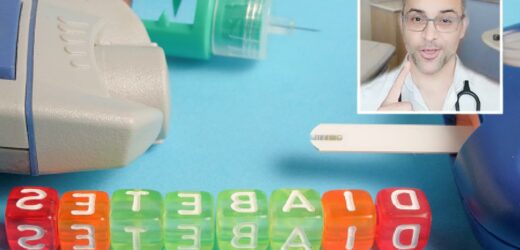CLOSE to five million people in the UK have diabetes with millions more at risk.
It's a condition that's on the up and Brits are increasingly worried about developing the illness.
Data shows that in the last seven days searches for 'how to prevent diabetes' have increased by over 100 per cent in the UK.
This is while searches for 'diabetes tests' have also increased, making it clear that people are concerned about the illness.
It's a common misconception that people who have diabetes do so because they are overweight and while this can make a difference, it's not always the case.
Posting to TikTok, one doctor revealed the six diabetes myths that you need to know.
Dr Siyamak Saleh explained that diabetes is not a mild or easy condition to have.
The first myth he debunked is that 'sugar causes diabetes'.
Most read in Health
HIDDEN SIGNS The subtle early warning sign of new stealth Omicron strain you mustn't ignore
UK's daily Covid cases fall by a quarter in a week as deaths drop by 100
I’m sharing this heartbreaking photo of my baby girl as a reminder to parents
Omicron's 'sister' spreads 33% quicker & can beat jabs BUT isn't more severe
He explained: "Sugar doesn't directly cause diabetes. Excess sugar can lead to obesity which in return increases risk of diabetes."
The second myth, he said, is that 'diabetes can be cured'.
"Diabetes can be REVERSED but not cured", he said.
Reversing diabetes is sometimes possible in people who have type 2 diabetes if they change their lifestyle, such as healthy eating and exercise.
Dr Saleh said that diabetics who reverse their condition must continue with these lifestyle changes to keep the condition in the reversed state.
Experts at NHS programme Diabetes My Way explain that diabetes remission in people with type 2 is when your blood glucose levels are at a normal healthy range without having to take any diabetes medication.
They explained: "The clinical definition of remission is when your HbA1c levels are less than 48mmol/mol on 2 occasions, at least 6 months apart, and you are not taking any diabetes medications.
"Type 2 diabetes is normally treated with diet and exercise and/or medication.
The signs of diabetes you should never ignore
To get diagnosed you need to see your GP – but first you need to spot the key symptoms of the illness, so it’s important to know what to look out for.
Dr Mohan Sekeram, who is GP in Merton, London, explained that diabetes is a condition where you may have too much sugar inside your body.
Posting to TikTok, he revealed some of the key signs and said you should always contact your doctor if you have any concerns.
He said: "You may find that you're passing a lot more urine than normal. This is because your body is trying to get rid of as much sugar as possible.
"As a result you may find yourself more thirsty and drink a lot more fluids."
Dr Sekeram added that you might find that you also experience blurred vision and that cuts and bruises might take a lot longer to heal.
"You may also experience some tingling in your hands and feet", he added.
Along with these symptoms he listed the other key signs as:
- Extreme hunger
- Unexplained weight loss
- Fatigue
- Irritability
"If you notice any of these symptoms, for yourself or for a loved one, then please do contact a health care professional to get further advice.
"It's very important for diabetes to be diagnosed as early as possible because it will progressively get worse if left untreated", he added.
"For many people, it’s a condition that progresses over time. Achieving diabetes remission can have a huge impact on your overall health and well-being, both in the short and longer-term."
Dr Saleh said the third myth, is that type 1 and type 2 diabetes are the same and explained that type 1 & 2 are caused by different mechanisms.
With type 1 diabetes, a person’s pancreas produces no insulin.
In type 2, cells in the body become resistant to insulin, so a greater amount is needed to keep blood glucose levels within a normal range.
The fourth myth, Dr Saleh said, is that diabetics must avoid sugar.
He said: "Diabetics can have sugar/desert/sweets as part of a healthy diet plan."
However, high blood sugar levels is a common problem with people who have diabetes so it's important that like everyone else, diabetics don't consume too much sugar – or else they risk these levels spiking.
The NHS said that very high blood sugar levels can cause life-threatening complications such as diabetic ketoacidosis (DKA) which can lead to a diabetic coma.
The next myth, Dr Saleh said, is that all diabetics are obese.
He explained: "Diabetes affects people from all ages, races and weights. Being overweight is a risk factor for diabetes."
Dr Saleh also said that genetics play a role in your risk of diabetes and that you're more at risk of the condition if a close family member, such as a parent or sibling, has the condition.
Weight is important though as being overweight is a risk factor when it comes to diabetes.
Obesity is believed to account for 80-85 per cent of the risk of developing type 2 diabetes and this is usually because obesity causes increased levels of fatty acids and inflammation.
This can lead to insulin resistance which in turn can lead to type 2 diabetes.
The last myth he said, is that "taking insulin makes you a failure".
He added: "Insulin is a life-saving drug and it's taken to control diabetes thus preventing complications and death.
"Diabetes is a progressive condition so at some point your body won't be able to produce enough insulin and you'll have to use insulin."
We pay for your stories!
Do you have a story for The Sun news desk?
Email us at [email protected] or call 0207 782 4104. You can WhatsApp us on 07423 720 250. We pay for videos too. Click here to upload yours
Click here to get The Sun newspaper delivered for FREE for the next six weeks.
Source: Read Full Article







